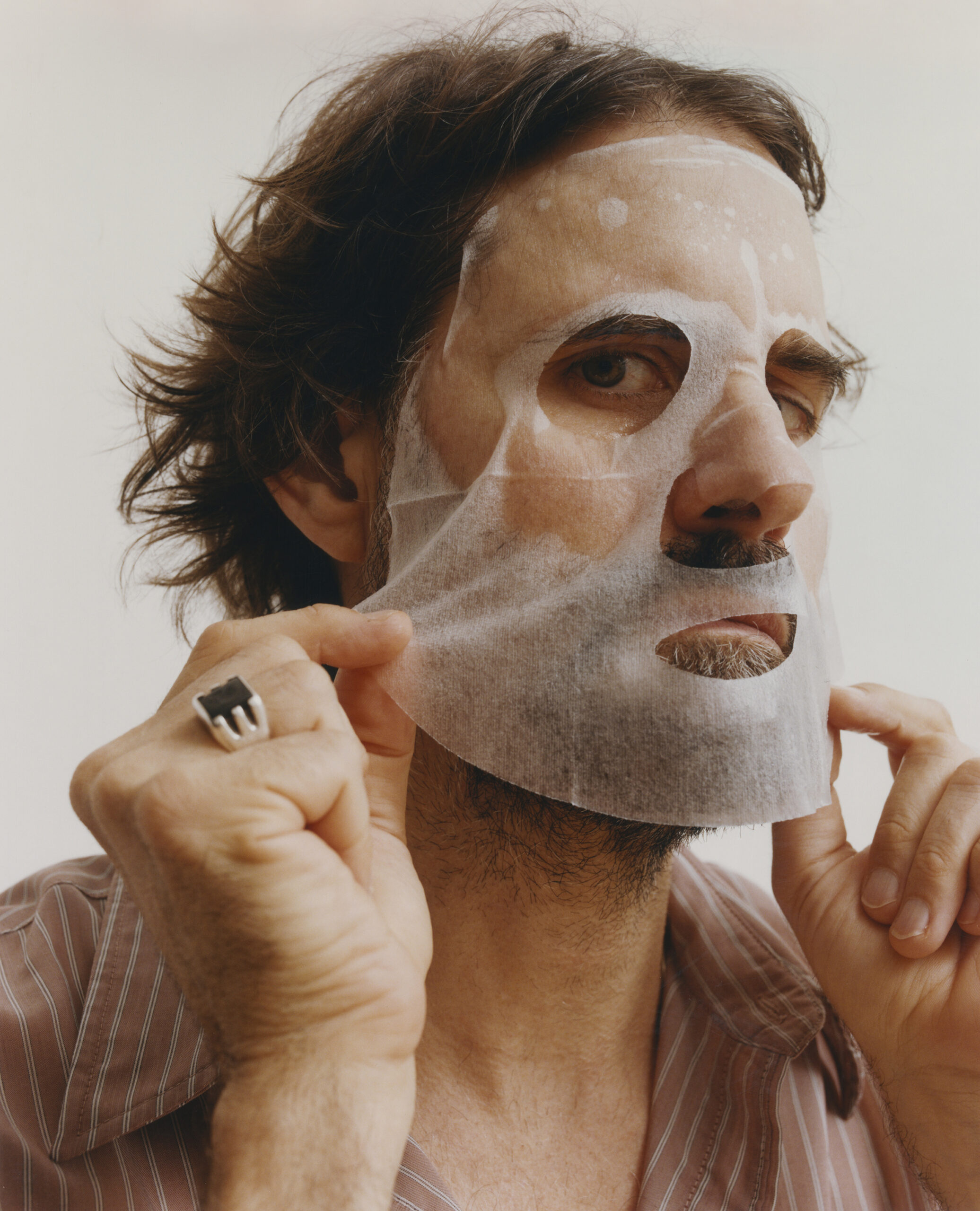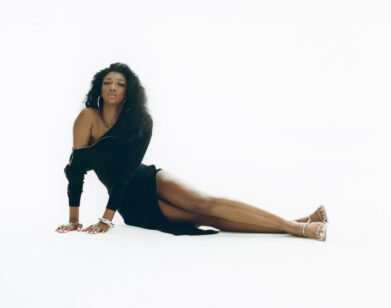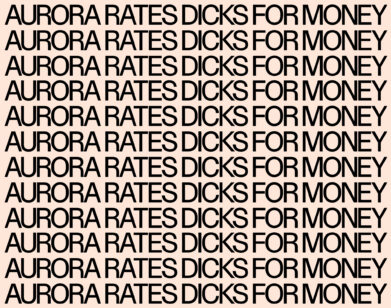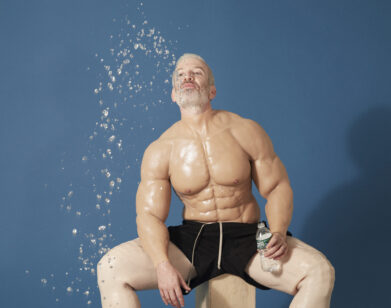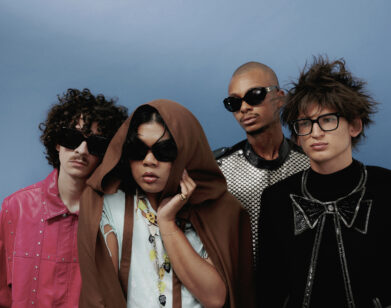musician
Andrew Wyatt Is Over All the Bullshit
After co-writing the Barbie score and producing hits for the poppiest of pop stars (Miley, Dua, Gaga), the Miike Snow frontman is putting it all out there with his second solo project and first breakup album, Someday It Won’t Feel Like Dying. From his home in Brooklyn, the Grammy and Oscar winner was joined by his old pal, the author Michael Chabon, to talk about critics, failure, and bouncing back.
———
TUESDAY 12 PM SEPT. 12, 2023 NYC
MICHAEL CHABON: So, I really had fun listening to these two new tracks.
ANDREW WYATT: Great. I’m still working on this record until the last minute, which is basically the end of September.
CHABON: The sonic palate seems pretty diverse.
WYATT: I’m thinking of splitting it into two different albums because one is very electronic and uses a lot of the impulses of the computer world, and then the other part, which is where I was during the beginning of this record, had much more to do with simple songwriting and a guitar or a piano. When you’re a music producer and part of your job is delving into the most modern techniques to work on records with different pop stars and make things sound fresh and current, there’s something really nice when I do my own record about breaking it back down to a piano and a melody and some lyrics.
CHABON: There’s a lot of painful emotional experiences feeding into the overall motivation for this record. When you’re in that state, is your impulse to reach for acoustic instrumentation more than picking up the keyboard and the samples?
WYATT: I have a hard time writing anything at the piano because I’m almost too knowledgeable with it, so I play the same chords. My hands do what they’ve been doing for years. I think the main instrument is just recording voice notes into my phone.
CHABON: Interesting. So at that point you’re not thinking about if this is going to be more electronic or acoustic?
WYATT: If I start with a firm intention which I can sing into my phone, I can picture the whole thing and then toy around with whether it’s a piano doing it or some crazy granular synth.
“I can understand why it’s not everyone’s cup of tea.”
CHABON: Last night I was listening to this interview with Neil Young talking about maybe his most recent album, and all of the material on the album was written by him taking walks in the woods and singing musical ideas into his phone, and then he’d get back and either pick up the guitar or sit down at the piano.
WYATT: And you can kind of reshape it somehow. He’s definitely a guy who has set a good example for being a dedicated weirdo. Sometimes when you’re a little older and you’ve been doing something for a while like you and I have, you could settle into a proper middle class existence and just deal with kids and family and your hobbies and see your friends. That’s something I really like about watching your career. You didn’t just do the very 20th-century novelist thing and retire to parts unknown.
CHABON: [Laughs] As much as I might’ve wanted to at certain moments.
WYATT: Right. And create this weird mystique about yourself. But you’ve done the opposite, which is go into comic books and do Star Trek. I feel similar to you in the sense that I haven’t tried to create some kind of sanctimonious layer of untouchability or infallibility about what I do, and that failing is okay.
CHABON: That’s really true. It is so important to be willing to fail and that’s so hard, especially for younger artists. Think about something like Project Runway, where you are literally punished for failure. People who try weird shit are off the show, right?
WYATT: That’s it.
CHABON: Because you tried it and you weren’t able to pull it off. That is such a fundamental part of becoming an artist. You don’t get to the good stuff without fucking up along the way. The other important part is people who’ve done things have to be as open as we can about the times we failed and why it failed. There’s no shame in it, but it’s really rare for people to talk about.
WYATT: Because everybody’s like, “I want to use this chance to create a brand that hypnotizes people into buying into me.” When people are like, “Should I use this opportunity to talk about the uglier, messier parts of my career or who I am, or use this moment to come off as looking beautiful and perfect?”—that’s what differentiates what our personal life is from our public life. But now that everyone has this portal into their personal life with them at all times, one would actually think that you are allowing yourself to be more, I’m going to use this word, vulnerable. A lot of times what I’m seeing is a practiced vulnerability.
CHABON: Yes.
WYATT: It’s rehearsed. Vulnerability take 12.
CHABON: [Laughs] That’s a really good album title.
WYATT: It’s like this interview, whatever this is. That’s one of the innovations that Andy Warhol had, which is to at least bring up the idea of what is performance, and how we perform for each other in these different ways, and what is artifice and what’s real. It goes into Wittgenstein, the whole semantics problem of, “What I say about how I feel isn’t what you perceive about how I feel, so what’s the point?” Why don’t you just turn the whole thing into a charade? You kind of deal with that in your books too, especially your last novel where it’s got that Jorge Borges thing of, some of this is my real life and some of this is pure bullshit.
CHABON: So much of what you go through as you’re growing up is discovering one after another at various ages: The things that you’ve been told or taught or shown, or the things that you’ve been made to want or to desire are—not all bullshit, but they were either performances or white lies. Whether it’s family history or things that you were told about your own parents’ marriage. These things you find out, it’s a constant process of disillusionment. Then it’s so hard to even be able to hold onto your sense of, well, there is a truth somewhere.
WYATT: Sometimes bad art is when people think they’re being truthful and they take the entire enterprise so seriously that they’re not in on the joke—that if this was all just your real feelings, you would just be in your bathtub crying.
CHABON: Exactly. Talking about failure, there are so many albums now in the history of the past 50 years of pop music where it’s—
WYATT: Initially a failure.
CHABON: Yeah. Where the original Rolling Stone review was a one-star review, and now it’s viewed as a classic, even by Rolling Stone.
WYATT: The critical community often thinks they understand what you should be doing, unless the public bitch-slaps the critical community—which you see too, when they go back and try to give new scores to old albums. That’s because the people have spoken and their true colors come out. So it’s important not to try and let any of those things guide what you’re doing. That’s hard sometimes, because you’re in a climate where you’re going to be critiqued and you’re going to have commercial results.
CHABON: And even if the common perception of what you’ve been doing isn’t really accurate, it’s there. You know what it is, you have to face it, and you know that there’s at least a chance that people are going to be saying, “Why does he think he can do country music? He’s trying to write a science fiction novel? You shouldn’t try to do what we don’t already expect from you.” But then there’s this whole other critical response that can say, “Oh, here’s more of that from this guy.”
WYATT: I think the only important thing to do is make sure you are doing what you have prescribed to be the right thing to say or do, and you sometimes have to get very quiet to be able to hear that.
CHABON: Yeah. It’s good to be out of the echo chamber, especially if you’re taking a chance.
WYATT: Because you could get too wrapped up in it. Miike Snow and many other bands that I’ve met and worked with, they have that tough thing with the second album, which is, you’re coming from obscurity, and then your second thing, you’re in the middle of the echo chamber and you don’t want to fuck up your good luck. It’s very easy to respond to all those things that you think you should say, and you’re introduced to this gigantic new crop of faces. Being at festivals, you’re seeing a lot of the same bands and people, and you’re thinking, “I want to make something they’ll like.”
CHABON: Exactly.
WYATT: All those things come into your brain.
CHABON: You want to prove you belong.
WYATT: Yeah, exactly. I think the reason why a lot of bands in the old days didn’t struggle with the second album was because there was more of a working class attitude towards it. It was a job, and no one knew what big business they were stepping into. The companies hadn’t really figured out how they wanted you to space out the work in order to maximize their return on their marketing money, so you could just make records with the same frequency as a guy doing a job at a factory. Now, people expect you to have this season of endless social calendars that have to do with promoting your record.
“What I’m seeing is a practiced vulnerability.”
CHABON: I mean, you’ve made a lot of records in different guises and contexts and with other collaborators, but as Andrew Wyatt, this is your second, right?
WYATT: Yep.
CHABON: And there’s been a fairly long gap in-between. Is that because you were so busy doing other things, right up until the current moment, like the Barbie score that you collaborated with Mark [Ronson] on? Or have you been waiting to get to work on this second album for a while now?
WYATT: Honestly, I don’t think I was in a position based on the first Andrew Wyatt album—talk about failure—but I feel very proud of that record.
CHABON: You should. It’s a great record. You risked a lot. For your first record, you get a little chamber orchestra in there? That’s a bold move.
WYATT: Yeah. I was doing exactly what I wanted, and I listen to it now and I can understand why it’s not everyone’s cup of tea.
CHABON: You don’t think a song with a character from Mrs. Dalloway is not top-40 gold?
WYATT: [Laughs] Exactly. But that to me is the luxury that I’m afforded as a result of doing my day job, which is trying to contribute to other people’s records and be of service in that way.
CHABON: What is the difference between what you bring as Andrew Wyatt when you’re brought in to work on someone else’s material, and what you bring to your own work?
WYATT: The only thing I leave behind when I’m working with other people is my fascism.
CHABON: [Laughs]
WYATT: When I’m working on my own music, I do it all myself because I don’t want to actually surrender anything to anyone. I just do exactly what I want. And when I’m in a room with someone else, it’s still pieces of my sensibility, but I surrender those contributions to the greater project that’s in somebody else’s fascistic view.
CHABON: Yeah, exactly.
WYATT: Obviously when you’re working with a director like Greta [Gerwig] for a film like Barbie, she’s the king, and you have to completely relinquish any ideas that you’re going to decide whether it’s right or wrong for the thing.
CHABON: You can make suggestions and they might be taken.
WYATT: Exactly. It’s basically, I keep everything about me, but I leave the “my way or the highway” piece out of it.
CHABON: That makes sense. Well, thanks Andrew, this was fun. It’s so nice to see your face, too.
WYATT: I know, man. Are you in Berkeley right now?
CHABON: I’m at our place in Maine.
WYATT: Until when?
CHABON: Until Thanksgiving.
WYATT: Oh, I got to come up and see you, man.
CHABON: Yeah, come on up.
———
Grooming: Kiyonori Sudo using Oribe at L’Atelier NYC.
Photography Assistant: John Vetromile.
Location: Cafe Studio NYC.

